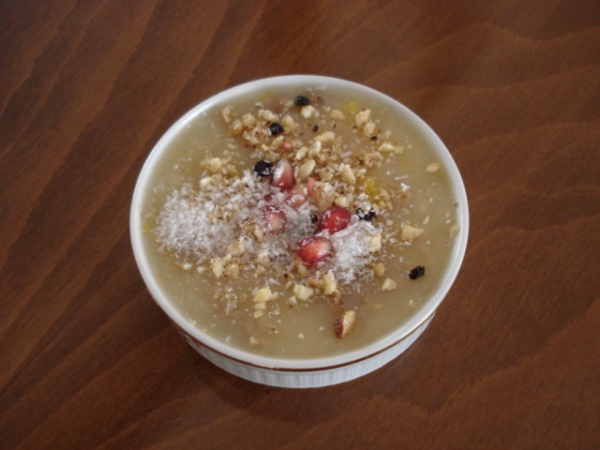Facts About Ashure
Ashure, often called Noah's Pudding, is a cherished Turkish dessert composed of a mixture of grains, fruits, dried fruits, and nuts. Although it can be enjoyed year-round, it holds special significance during Muharram, the first month of the Islamic calendar. The 10th day of Muharram, known as the Day of Ashure, is particularly momentous. Interestingly, this dessert is entirely plant-based, making it a fantastic option for vegans.
According to legend, Ashure dates back to Noah's time. Turkish Muslim tradition recounts that Noah made this pudding using leftover fruits, seeds, grains, and legumes after the flood. This tale endows Ashure with symbolic meaning, representing peace and unity. In Turkey, it is customary for Muslims to prepare and share it following fasting periods. Typically made in large batches, Ashure is distributed to friends, neighbors, and relatives as a gesture of goodwill and love, transcending religious boundaries.
The name "Ashure" is derived from the Arabic word "Ashura" meaning 'tenth,' because the dish is traditionally prepared on the 10th of Muharram or shortly thereafter. This dish carries historical and cultural significance, with recipes varying across regions and families. Traditionally, Ashure includes at least seven ingredients, though some insist on ten or twelve to align with the 'tenth' theme. Common ingredients include wheat, barley, rice, beans, sugar, dried fruits, and nuts. Some variations even incorporate orange and lemon peel, spices, and flavorings like rose water or orange blossom water.
The origins of Ashure are tied to the story of Noah's Ark. After surviving the flood, Noah's family celebrated by creating a special dish from their remaining supplies. Today, Turkish families honor this tradition by making Ashure pudding and sharing it with others, including the less fortunate. The Day of Ashure is an important date in the Muslim calendar, celebrated globally to commemorate various spiritual events.
Ashure has also permeated popular culture. Turkish author Elif Şafak has featured the dessert in her novels, such as "The Flea Palace" and "The Bastard of Istanbul." Other cultures have their own versions of Ashure, like the Armenian "anuşabur" typically served during Christmas and New Year's Eve.
Ashure is more than just a dessert; it is a symbol of cultural heritage, unity, and generosity. It embodies the spirit of sharing and communal harmony, bridging different traditions and beliefs.

 Romania
Romania